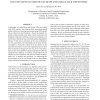Free Online Productivity Tools
i2Speak
i2Symbol
i2OCR
iTex2Img
iWeb2Print
iWeb2Shot
i2Type
iPdf2Split
iPdf2Merge
i2Bopomofo
i2Arabic
i2Style
i2Image
i2PDF
iLatex2Rtf
Sci2ools
117
click to vote
ICMCS
2006
IEEE
2006
IEEE
Analysis and Evaluation of the Skype and Google-Talk Voip Systems
In this paper, we study Skype and Google Talk, two widely used VoIP systems, and compare their perceptual speech quality with that of our proposed system using UDP packet traces collected in the PlanetLab. Based on methods for speech coding, packetization, jitter control, estimation and feedback of network conditions, and loss concealments, our results show that Skype has noticeable quality degradations because it only uses a maximum of two-way redundancy for loss concealment, does not handle out-of-order arrivals, and applies a fixed jitter control of 60 ms relative to the expected arrival time. Its slow loss-adaptation time of more than one minute to change from one-way to two-way redundancy makes it susceptible to quality degradation under fast changing loss conditions. In contrast, Google Talk does not employ any loss adaptation and performs similar to Skype under low- to medium-loss scenarios. By addressing the shortcomings of Skype and Google Talk, we demonstrate improvements i...
Google Talk | ICMCS 2006 | Skype | Two-way Redundancy |
Related Content
| Added | 11 Jun 2010 |
| Updated | 11 Jun 2010 |
| Type | Conference |
| Year | 2006 |
| Where | ICMCS |
| Authors | Batu Sat, Benjamin W. Wah |
Comments (0)

